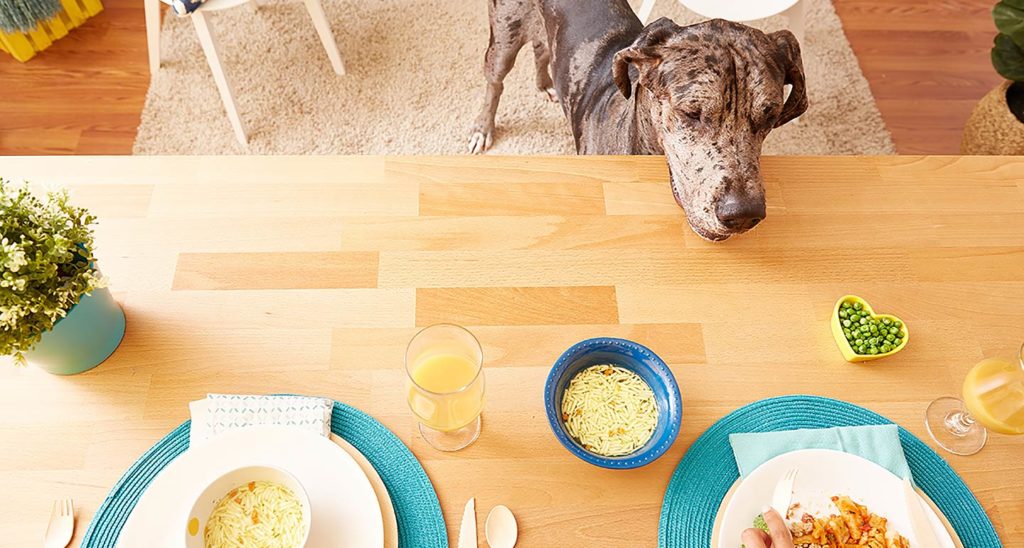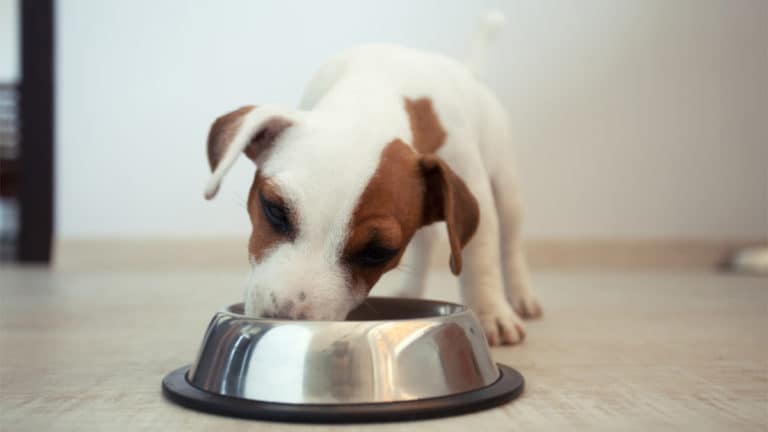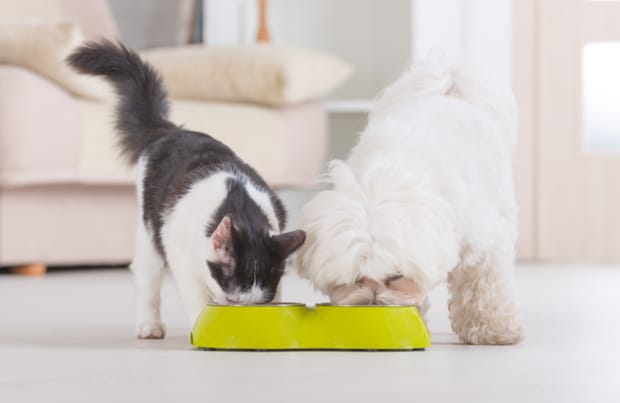What’s Wrong With Giving Dogs Table Food?
Pet parents love to spoil their pets by giving dogs table food as a way to express their love. I cannot count the number of times I hear my pet parents proudly telling me, “Last night Fluffy ate pan-seared filet mignon with garlic and herbed butter.” I secretly think to myself that Fluffy is one lucky pet, but I also know they are not considering whether it is bad food for dogs.
There are some health issues that can result from giving dogs table food. Besides potentially feeding your pup foods dogs can’t eat, consistently serving your dog human food can have other unforeseen consequences. So, what are the problems that I see as a veterinarian with feeding your dog food from the table, and what can we do to alleviate these problems?
Begging at the Table
This is a common behavioral response I see when my pet patients are offered food from the table. The moment the dishes come out, the pets are at the table begging. Some food beggars are polite and keep their distance while their parents eat, however, some cannot resist the temptation and keep reaching for the food on the table or putting their nose on your lap. While some of my pet parents do not mind this behavior, others have a difficult time with it. Try to remember, dogs adapt behaviors to what their parents have taught them is acceptable. If you are giving dogs table food, even at the end of your meal, your pet will learn that this is acceptable behavior and will act accordingly.
Not Eating Their Own Food
Dogs are going to choose a filet mignon over kibble every day of the week. Once your pets get a taste of your food, they are going to prefer it more than their dog food. I commonly receive complaints from clients that their pets will not eat their dog food. The first thing I ask is, “Are you giving your pet people food?” Almost 100% of the time the response is “Yes.” If your dog is refusing his food, the first step to getting him to eat more dog food is to stop giving them food from your table.
Obesity
Obesity in pets is a growing concern. I am seeing more and more overweight pets. Just like us, obesity can lead to other diseases such as heart disease, diabetes, joint problems and more. When we feed our pets human food, it is hard to calculate how many additional calories are being added to their diets. Too often I hear from my clients that they are feeding their dogs the exact recommendations on the chart for their dog’s weight; however, they are not taking into account the extra calories their pet is getting from all the treats. When feeding your pet table food, you could be giving them a whole extra meal each day without even realizing it.
Unbalanced Diets
Many of my clients prefer to cook their meals for their fur babies. I think this is great and I always encourage homemade meals for pets. One of the biggest concerns with home-cooked diets is whether the diet is complete and balanced. If you are cooking for your pet, it is so important to make sure your fur baby is getting the proper minerals, vitamins, nutrients and portions of food.
Gastrointestinal Upset
Unlike dogs, people eat different foods daily, and our gastrointestinal tracts develop and adjust according to what we eat. On the other hand, pets are used to eating the same food every day. The flora (or natural bacteria) that reside in the gastrointestinal tract to help digest and break down foods develop and grow according to a pet’s consistent daily diet. When your pet eats something that they are not used to, like a steak or piece of cheese, their GI tracts go into shock trying to digest the new food. Human foods for dogs can result in vomiting and diarrhea, and in more severe cases, pancreatitis.
Toxicity
There are so many foods that are toxic to dogs. For instance, did you know that you should never feed your dog grapes, as they can cause kidney disease in pets? The following is a list of what not to feed dogs:
- Alcohol
- Onions, garlic and chives
- Citrus
- Grapes, raisins and macadamia nuts
- Milk and dairy
- Salt and salty snack foods
- Xylitol (a sugar alcohol used typically in sweeteners)
- Chocolate, coffee and caffeine
- Raw/undercooked meat, eggs and bones
- Yeast dough
Make sure to avoid giving too much food from the table. If you treat your pets to your food every once in a while, make sure that it is food dogs can eat. Although food can sometimes be a symbol for love and affection, in some cases it can cause harm and illness. You don’t want to accidentally give your dog one of the toxic foods for dogs and be the reason they have to spend the night at an emergency vet or in discomfort all night. As always, your pet’s health and well-being is always my top priority!
Share:









